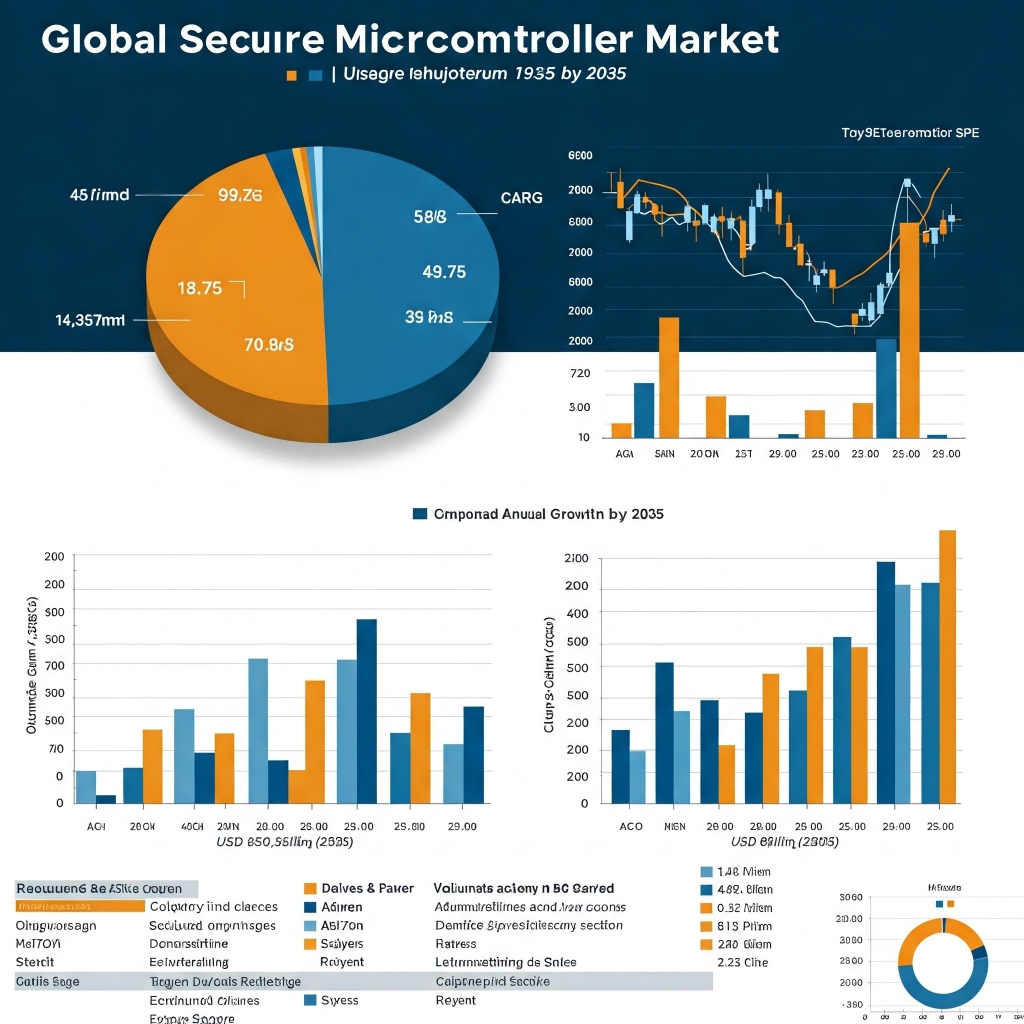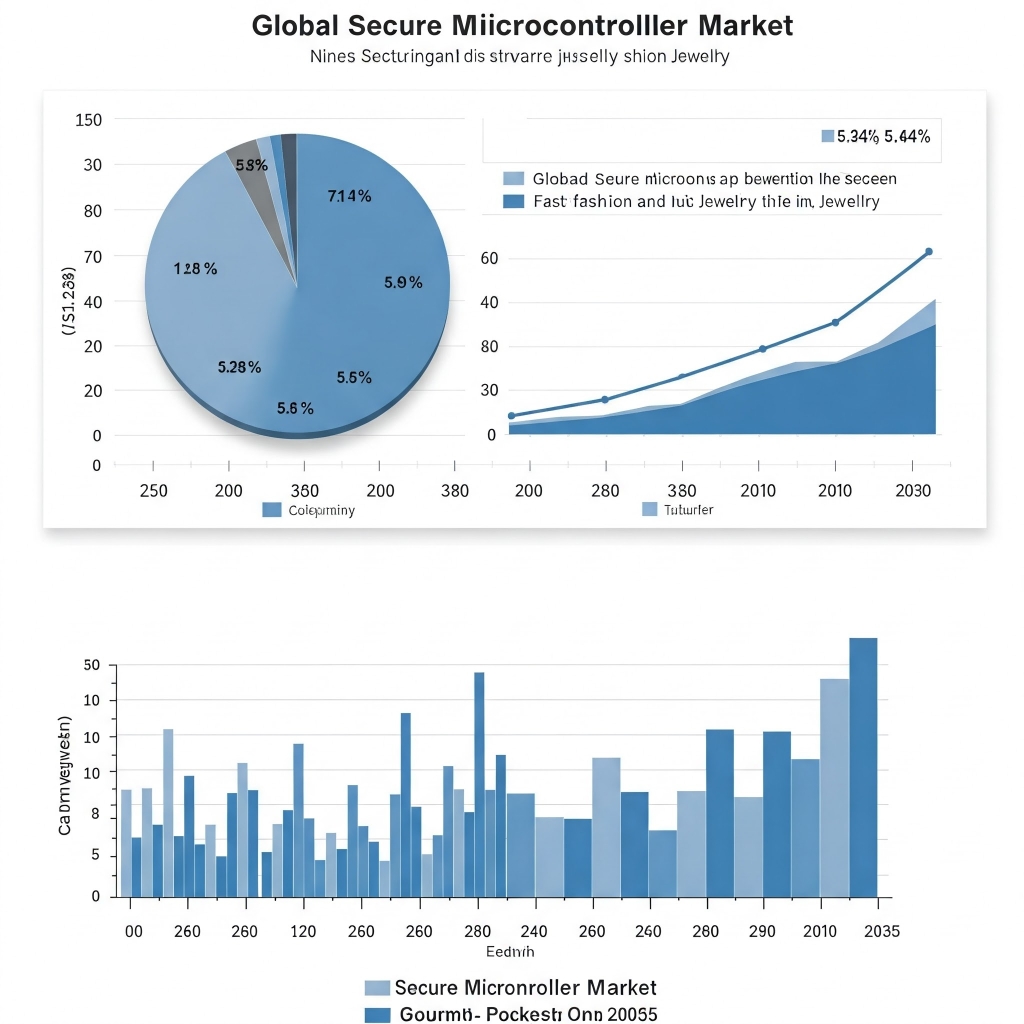Market Forecast and Future Outlook
According to in-depth analysis, the global secure microcontroller market is projected to achieve a CAGR of 12.5% between 2025 and 2035. Valued at approximately USD 27.6 billion in 2025, it is expected to surge to nearly USD 80.7 billion by 2035, fueled by rising demand across various security-sensitive sectors.
Market Overview
The rapid expansion of secure microcontrollers is underpinned by surging data security needs across banking, automotive, telecom, and consumer electronics. These microcontrollers are pivotal in encrypting, authenticating, and safeguarding sensitive data, helping prevent digital intrusions and fraud.
With the proliferation of IoT devices and mobile payment platforms, alongside stringent data protection laws globally, the demand for robust microcontroller-based security systems continues to rise. Notable industry players driving innovation in this space include STMicroelectronics, NXP, and Infineon.

Download Sample Ask for Discount Request Customization
Growth Drivers
Escalating IoT Integration
Smart homes, industrial sensors, and wearable devices rely on secure microcontrollers to counteract cyber threats. As adoption increases across industries, so does the urgency for secure microcontroller implementation.
Surge in Cybersecurity Awareness
The increasing frequency and complexity of cyberattacks are heightening the demand for microcontrollers that provide strong encryption and secure authentication, especially in finance and healthcare sectors.
Tightening Regulatory Landscape
Global data protection frameworks like GDPR and CCPA compel organizations to adopt secure microcontrollers to comply with stringent data security standards and avoid costly breaches.
Advancements in Encryption Capabilities
Progress in cryptographic technology enhances the capabilities of secure microcontrollers, making them more effective against evolving digital threats.
Rise of Digital Transactions
The growing usage of mobile wallets and contactless payments requires advanced security features that only secure microcontrollers can offer.
Download Sample Ask for Discount Request Customization
Report Scope for the Global Secure Microcontroller Market
|
Parameter
|
Details
|
|
Report Title
|
Global Secure Microcontroller Market Outlook 2025–2035
|
|
Forecast Period
|
2025 to 2035
|
|
Base Year
|
2024
|
|
Market Size (2025)
|
USD 27.6 Billion
|
|
Market Size (2035)
|
USD 80.7 Billion
|
|
CAGR (2025–2035)
|
12.5%
|
|
Market Segmentation
|
By Application, By Type, By End-User Industry, By Region
|
|
Applications Covered
|
Banking, Automotive, Telecommunications, Consumer Electronics, IoT
|
|
Types Covered
|
Secure Elements (SE), Trusted Platform Modules (TPM), Hardware Security Modules (HSM), Others
|
|
End-User Industries
|
Consumer Electronics, Automotive, Industrial, Healthcare, Government
|
|
Regions Covered
|
North America, Europe, Asia-Pacific, LAMEA
|
|
Key Players
|
NXP, Infineon, Microchip, STMicroelectronics, Renesas, and others
|
| |
|
|
Primary Drivers
|
IoT Adoption, Cybersecurity Threats, Data Regulations, Mobile Payments
|
|
Key Opportunities
|
IoT Expansion, Government Cybersecurity Investments
|
|
Key Challenges
|
Rising Competition, Evolving Cyber Threats
|

Download Sample Ask for Discount Request Customization
Key Market Challenges
Intensified Competitive Landscape
The influx of new players and technological disruptions lead to fierce price competition and innovation pressure, particularly challenging for emerging businesses.
Persistent Security Threat Evolution
Hackers continually adapt, pushing manufacturers to invest heavily in R&D to stay ahead of vulnerabilities and maintain trust.
Opportunities on the Horizon
Expanding IoT Ecosystems
With billions of IoT devices entering homes, industries, and cities, there’s a booming opportunity for microcontroller vendors to offer advanced security solutions.
Government Cybersecurity Investments
Public-sector funding and defense grants, especially in countries prioritizing critical infrastructure protection, are creating fresh growth channels for secure microcontroller developers.
list of key players in the Global Secure Microcontroller Market
-
NXP Semiconductors
-
Infineon Technologies AG
-
Microchip Technology Inc.
-
STMicroelectronics
-
Renesas Electronics Corporation
-
Texas Instruments Incorporated
-
Samsung Electronics Co., Ltd.
-
Maxim Integrated (Analog Devices, Inc.)
-
Broadcom Inc.
-
Cypress Semiconductor (Infineon Technologies subsidiary)
Segmentation Insights
By Application
-
BankingSecure transactions and credential storage
-
AutomotiveCybersecure in-vehicle systems
-
TelecommunicationsEncrypted communications
-
Consumer ElectronicsSafeguarding personal data on smart devices
-
IoTIntegral for privacy and data protection
By Type
-
Secure Elements (SE)Compact, high-security chips for sensitive data
-
Trusted Platform Modules (TPM)Cryptographic keys and boot processes
-
Hardware Security Modules (HSM)Enterprise-level cryptography
-
OthersIndustry-specific or hybrid security solutions
By End-User
-
Consumer ElectronicsProtecting personal and financial data
-
AutomotiveEnsuring communication and safety in smart vehicles
-
IndustrialSecuring operational automation systems
-
HealthcarePrivacy in patient data and connected medical devices
-
GovernmentNational cybersecurity and defense applications
Regional Landscape
-
North AmericaDominated by tech adoption and regulatory compliance
-
EuropeStrong demand driven by GDPR and automotive innovation
-
Asia-PacificFastest growth driven by IoT, mobile banking, and smart city initiatives
-
LAMEARising adoption due to digital transitions in banking, healthcare, and urban development
Noteworthy Developments (2024–2025)
-
NXP Semiconductors launched next-gen secure microcontrollers for smart home and industrial IoT.
-
Infineon Technologies partnered with automotive leaders to bolster cybersecurity in autonomous vehicles.
-
Microchip Technology expanded its hardware security portfolio with new HSMs.
-
Renesas Electronics introduced security-optimized microcontrollers for automotive sectors.
-
STMicroelectronics released secure NFC-enabled elements for mobile transactions.


